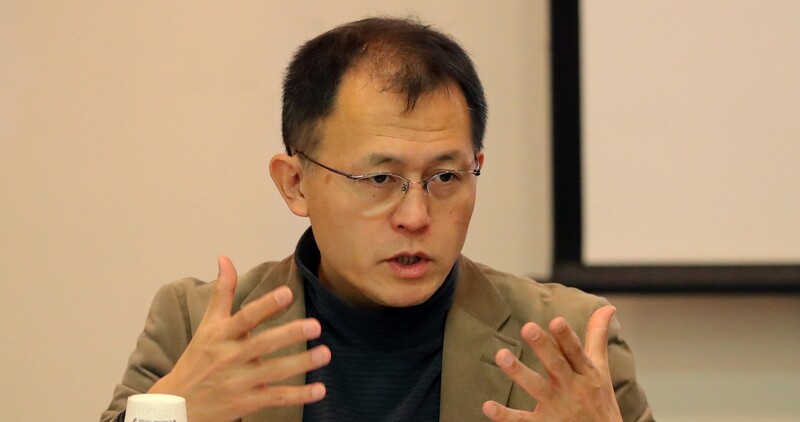hankyoreh
Links to other country sites 다른 나라 사이트 링크
[Interview] Activist sees US-North Korea summit as an important step on the road to global denuclearization

“If denuclearization of North Korea can be achieved through summits with South Korea and the US, this will a historical step toward a world without nuclear weapons,” said Akira Kawasaki, an international steering committee member with the International Campaign to Abolish Nuclear Weapons (ICAN). A coalition of civic groups around the world, ICAN won the Nobel Peace Prize in recognition of its success in leading to the UN’s adoption of the Nuclear Weapon Ban Treaty in July 2017.
While in South Korea to attend a “South Korean-Japanese citizens’ peace meeting” organized by the city of Seoul, Kawasaki sat down for an interview with the Hankyoreh on Mar. 14 at the offices of the group People’s Solidarity for Participatory Democracy (SPD) in Seoul’s Jongno district.
The Nuclear Weapon Ban Treaty spearheaded by ICAN goes a step farther than the previous Nuclear Nonproliferation Treaty to mandate the abandonment of nuclear weapons by countries that already possess them. The treaty was adopted by the UN General Assembly last July with support from 122 countries - not including nuclear powers like the US and Russia or their allies, including South Korea and Japan.
“It’s still a treaty that the nuclear powers and their allies are not taking part in, but with an absolute majority of countries now supporting it, I anticipate it will function as a form of international pressure where the supporters close ranks against the opponents,” Kawasaki said.
Describing the emergence of planned inter-Korean and North Korea-US summits as “miraculous,” Kawasaki stressed the importance of “establishing international verification standards” with a “step-by-step solution based on their implementation” to bring about North Korea’s eventual denuclearization.
“We need international standards as to what constitutes ‘complete, verifiable, and irreversible dismantlement’ (CVID), along with procedures and rewards for each step,” he advised.
Kawasaki also noted that examples of nuclear powers dismantling their programs in an orderly fashion with international verification are “historically rare.”
“If North Korea’s denuclearization does become a reality, it could be a turning point toward a world without nukes,” he suggested.
“It’s a precedent that could gradually be applied to other nuclear powers like India and Pakistan,” he added.
Kawasaki describes Japan’s experiences with the atomic bombs dropped on Hiroshima and Nagasaki as the source of his dedication to campaigning for peace.
“I can certainly understand Koreans’ complicated feelings [after experiencing colonial rule by Japan],” he said, adding this stemmed from “Japan’s failure to fully reflect as a country on its responsibility for colonial rule.”
“Fighting historical revisionism in Japan is every bit as an important a part of the Japanese peace movement as fighting for denuclearization around the world,” he continued.
ICAN has sometimes been accused of “succumbing to romantic delusions” by the realists of the global political order, who trust in nuclear deterrence and balances of power. But Kawasaki contends that the so-called realists are the actual romantic ones.
“Underlying the idea of security through nuclear deterrence is the presumption that nuclear weapons could never actually be used,” he said.
“I think it’s romantic to conclude that because they haven’t been used for the 70 years, they won’t ever be used again,” he added.
“They all kept saying that nuclear power was safe, and then the Fukushima nuclear power plant accident happened,” Kawasaki continued.
“I’d like to ask them whether nuclear weapons and nuclear power and the kinds of issues where we want to end up talking about ‘unexpected events’ after an accident occurs.”
By Lim Jae-woo, staff reporter
Please direct questions or comments to [english@hani.co.kr]

Editorial・opinion
![[Column] Park Geun-hye déjà vu in Yoon Suk-yeol [Column] Park Geun-hye déjà vu in Yoon Suk-yeol](https://flexible.img.hani.co.kr/flexible/normal/500/300/imgdb/original/2024/0424/651713945113788.jpg) [Column] Park Geun-hye déjà vu in Yoon Suk-yeol
[Column] Park Geun-hye déjà vu in Yoon Suk-yeol![[Editorial] New weight of N. Korea’s nuclear threats makes dialogue all the more urgent [Editorial] New weight of N. Korea’s nuclear threats makes dialogue all the more urgent](https://flexible.img.hani.co.kr/flexible/normal/500/300/imgdb/original/2024/0424/7317139454662664.jpg) [Editorial] New weight of N. Korea’s nuclear threats makes dialogue all the more urgent
[Editorial] New weight of N. Korea’s nuclear threats makes dialogue all the more urgent- [Guest essay] The real reason Korea’s new right wants to dub Rhee a founding father
- [Column] ‘Choson’: Is it time we start referring to N. Korea in its own terms?
- [Editorial] Japan’s rewriting of history with Korea has gone too far
- [Column] The president’s questionable capacity for dialogue
- [Column] Are chaebol firms just pizza pies for families to divvy up as they please?
- [Column] Has Korea, too, crossed the Rubicon on China?
- [Correspondent’s column] In Japan’s alliance with US, echoes of its past alliances with UK
- [Editorial] Does Yoon think the Korean public is wrong?
Most viewed articles
- 1‘We must say no’: Seoul defense chief on Korean, USFK involvement in hypothetical Taiwan crisis
- 2Will NewJeans end up collateral damage in internal feud at K-pop juggernaut Hybe?
- 3[Column] Park Geun-hye déjà vu in Yoon Suk-yeol
- 4Why Korea shouldn’t welcome Japan’s newly beefed up defense cooperation with US
- 5Thursday to mark start of resignations by senior doctors amid standoff with government
- 6N. Korean hackers breached 10 defense contractors in South for months, police say
- 7[Guest essay] The real reason Korea’s new right wants to dub Rhee a founding father
- 8[Column] ‘Choson’: Is it time we start referring to N. Korea in its own terms?
- 9Kim Jong-un expressed ‘satisfaction’ with nuclear counterstrike drill directed at South
- 10[Editorial] New weight of N. Korea’s nuclear threats makes dialogue all the more urgent